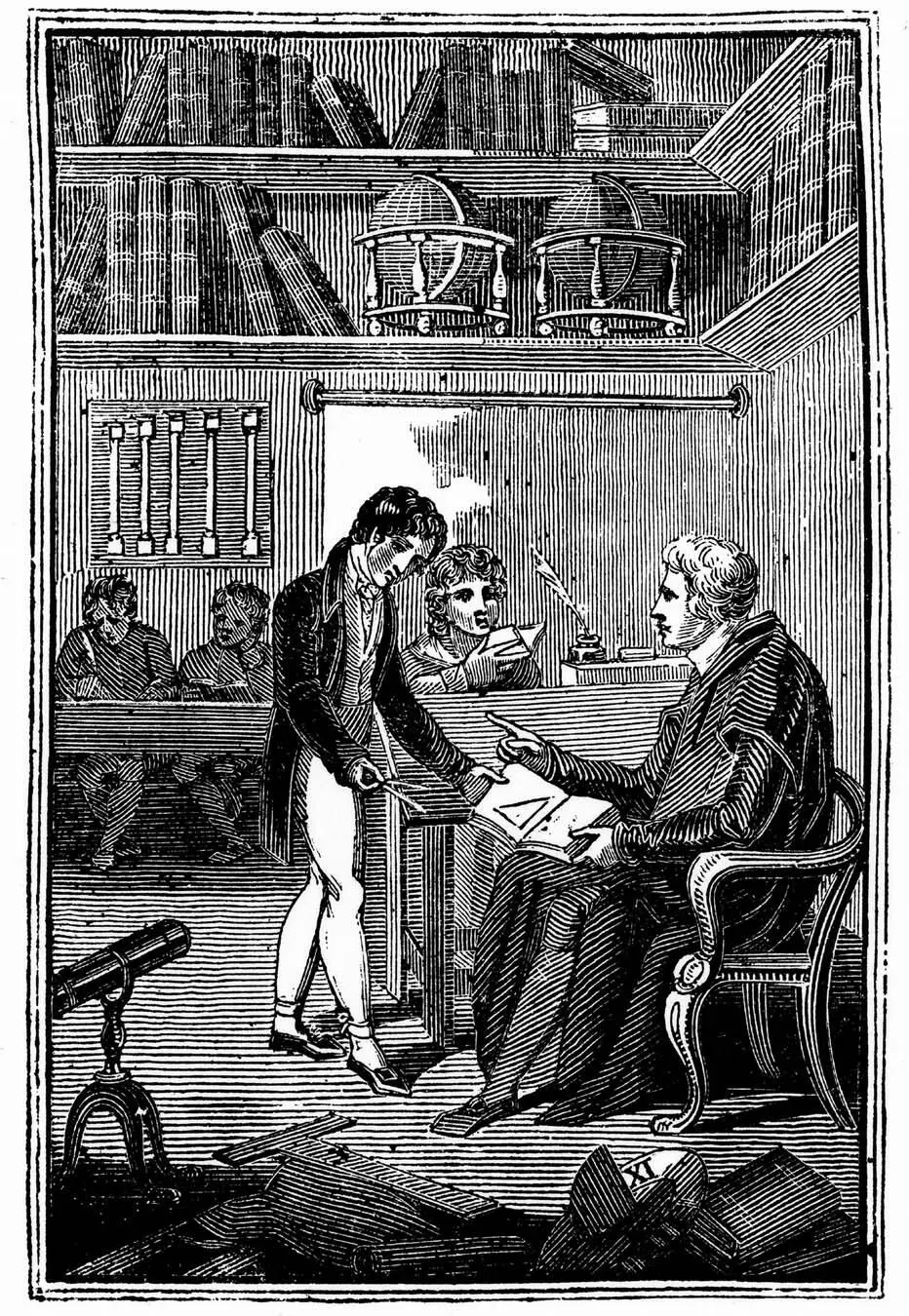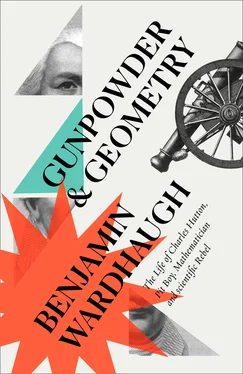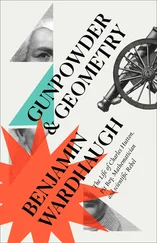The pit, and its cup of gall, could have been the rest of his life: for a time there must have been no reason to imagine anything else was going to happen. Two things made a difference.
One was that Hutton was bad at hewing coal. The pay bills show him bringing down less coal than his fellows, and as a result he was employed less – much less – than they were. In old age Hutton would say his injured arm was to blame for his poor performance at the coalface. Maybe it was, though we never hear that the lame arm affected him later in his life. Maybe it was simply that his schooling and his comparative lack of experience down the mines had left him without the strength, the endurance and the skills the work needed.
The other thing was that Hutton was using his time away from work to exploit his connections, to invent a way out of colliery life and make something quite different for himself. Who knows just what hustling Charles Hutton did during the months he worked down the pit, in the winter of 1755–6. But it came to the point that he knew he had it in his power to escape, and some sort of scene appears to have taken place at the colliery. He was ‘laid idle’ one day, whether for some fault or simply because a more able man was available, and he made a fuss about it. He told the overman that he’d soon be out of his power, that he was going to go to a more respectable life. It must have been quite a row; men who were there remembered the scene seventy years later.
But Hutton was speaking the truth, however ungraciously. Jonathan Ivison had been the curate at Whitburn for four years now, and if his Jesmond schoolroom had been limping along meanwhile, it was time to pass it on for good to someone who lived near by. Ivison knew the man for the job. Presumably he squared it with the owner of the building where the school was held. And presumably he squared it with Francis Frame. For he wanted Charles Hutton to take over.
At the age of eighteen, Hutton was legally a minor and too young, in theory, to set up on his own in any trade or profession. (He was also, perhaps crucially, too young to have signed any sort of binding contract at the colliery.) But it’s hard to imagine his parents having much hesitation about an offer that would get the useless hewer away from the coalface, where he was little more than an obstacle in the way of fitter, stronger men, and would secure him – if he pulled it off – an income and even a career. One day in March 1756 Charles Hutton clung to the rope and ascended to day for the last time.
2
Teacher of Mathematics

Autumn 1758. High Heaton, near Newcastle. Silence (or almost). Boys seated at rows of desks. Slate pencils squeaking; quills scratching on paper. Another harvest is in the fields, and the coalface is as hellish as ever. But Charles Hutton is above ground now, in what was once Jonathan Ivison’s schoolroom.
The young schoolmaster is seated at the front, where he can see all the boys. One at a time comes forward, shows his work, is praised or blamed. Can he spell the words set the class; has he written his fair copy fairly enough? Can he read the passage assigned? Has he worked the sum correctly and by the right method? Does he know his catechism answers? He is given a new exercise to do or a new instruction or definition to copy down in his book; sent back to his desk.
Over the course of the day and the week the work cycles through reading, writing, arithmetic, divinity. The boys spell from a textbook: probably the same one, by Ann Fisher, that Hutton learned from himself. They read from the Bible, learn to count or do their sums from another book. Start again on Monday.
It would be intriguing to know how Charles Hutton spoke to his students. Firmly or gently? Leading or prodding? What was he really like as a teacher? We shall never know.

A master and his pupils.
But the books he wrote, later on, record something of the quality of thought that went into Charles Hutton’s work in the classroom; they hint at a man who had his material impeccably organised, who always had something new to show the student, a new trick, a new bit of complexity to stretch the growing mind. The Georgian classroom involved lots of one-on-one teaching, most of the children working quietly while the teacher spoke with each in turn at his desk. It demanded huge agility of mind from the teacher, as each student to be seen was at a different place and needed a different sort of help.
It’s easy to imagine that a teacher with a less than perfect grasp of the material, or who relied too heavily on a printed textbook, would end up with most of the students spending most of the time on repetitious exercises they only partly understood, and would quickly find he had lost the weaker ones. But for the exceptionally wide-awake teacher the system provided a maximum of flexibility and opportunity. It depended on having the material very clear in your mind, and above all minutely graded into separate steps. Hutton seems to have excelled at this. He would make a few enemies during his long life, and pick up criticism, some of it deserved. But no one ever denied he was a superb teacher.
He was talented, he was full of energy and he worked hard. The school at High Heaton ran both days and evenings, teaching local boys and adult miners, some of them Hutton’s former mates from the pits. Local children flocked to him as students, to such a degree that the schoolroom proved too small. So Hutton obtained the use of a room in nearby Stote Hall, and there he and his scholars trooped daily for their lessons.
It’s demolished now, the former mansion of Sir Robert Stotte; only the gateposts and gatehouse survive. But photos show an imposing house. It looked over the small valley of Jesmond Dene and you can still retrace Hutton’s walk of a quarter of an hour or so from one village to the other. First a very gentle rise through what was then open farmland; then down the hill and across a steepish valley of never-farmed woodland. Sloping paths and views away through the trees. It was already a walk into a very different world from that of the colliery, and infinitely removed from the coalface in the Rose Pit.
And yet for many, schoolteaching was a despised profession, a mark of failure for a man of education. ‘School’, indeed, is a grand term for what was no more than a room provided by someone’s goodwill and in which Hutton collected pennies for teaching young children to read and write, to add up and remember a few Bible stories. Chemist and religious controversialist Joseph Priestley was typical: ‘Like most other young men of a liberal education, I had conceived a great aversion to the business of a schoolmaster, and had often said that I would have recourse to anything else for a maintenance in preference to it.’ Elementary teaching in particular was widely seen as work for old women, widows, or the humblest members of society. Nor did it bring any very great material rewards for its long, demanding hours: pay only slightly above that of a labourer; no such thing as promotion; no such thing as a pension.
There was no teacher training. Giftless graduates stumbled into teaching and stumbled through it; impecunious clergymen practised it with a savage resentment that they took out physically on the children in their charge (it was the boast of Dr Parr of Harrow that he never flogged a boy twice in the same lesson). A typical contemporary observation is contemptuous of what went on in small ragged schools like Hutton’s:
Читать дальше














